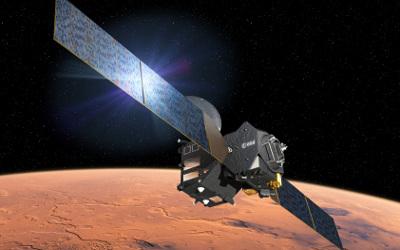Funding to analyse hundreds of thousands of images from Mars spacecraft

An OU researcher has received just over half a million pounds to use new Machine Learning tools to analyse huge image datasets collected by spacecraft orbiting Mars.
Professor Matt Balme in the OU’s Faculty of Science, Technology, Engineering and Mathematics is leading the team responsible for using a new type of Artificial Intelligence (AI) called Deep Learning on this project: Using Machine Learning And Trace Gas Orbiter Cassis Multispectral Images For ExoMars Rover Strategic Operations And Mars Science.
Many of the images that will be used in the project were acquired by the ESA ExoMars Trace Gas Orbiter spacecraft, which has been in orbit around Mars since 2016. They were taken using the multi-spectral CaSSIS camera onboard the ESA spacecraft.
Professor Balme said: “Hundreds of thousands of images have been returned by spacecraft orbiting Mars and some are of such high quality that we can see surface features less than a metre across. Being able to apply Deep Learning to this huge dataset means that we can detect the features we want much more quickly, allowing us humans more time to analyse the results and do the science.”
The Science of Deep Learning has the potential to revolutionise planetary exploration. While previous efforts have largely been hypothetical test cases, this project aims to deploy this technology for both remote sensing science and space mission operations.
The team aims to measure the orientation of large sand ripples on Mars and compare these to the results of the OU’s Mars General Circulation climate models in order to unravel the mysteries of martian climate. They will also be applying Deep Learning to support the ESA Rosalind Franklin Rover Mission, by extending human produced geological maps to cover the new landing area of the delayed mission.
The OU colleagues working with Professor Balme on this project are Dr Alex Barrett and Dr Peter Fawdon, who will provide expertise in planetary geomorphology. The ExoMars Trace Gas Orbiter team led by Professor Manish Patel will Provide climate data, with Dr Kylash Rajendran being the atmospheric physicist running the models. They will be collaborating with their “Big Data” partners Dr Mark Woods and Dr Mateusz Malinowski at the Centre for Modelling and Simulation in Bristol.
Dr Barrett added: “Deep Learning lets us tackle questions which would be intractable using conventional, human based, mapping. It is exciting to be able to use this cutting-edge technique for science.”
You may also be interested in:
Contact our news team
For all out of hours enquiries, please telephone +44 (0)7901 515891
Contact detailsNews & articles

The FUNdamentals: Why fun matters more than we think
In a world that feels increasingly serious and pressured, fun can seem like a guilty pleasure — something optional, even frivolous. But what if fun isn’t an add on at all? What if it’s essential?